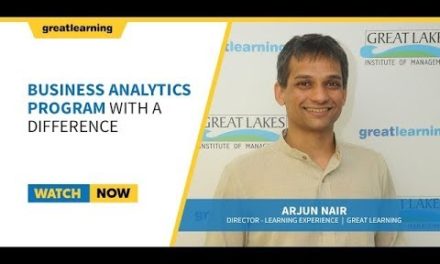This Big Data Analytics Tutorial for beginners is designed to help the Big Data beginners to gain the basic knowledge required for them to start their Big Data career. This video give an introduction to Big Data. This Simplilearn’s Big Data tutorial helps you to understand Big Data in detail.
Subscribe to Simplilearn channel for more Big Data and Hadoop Tutorials –
Check our Big Data Training Video Playlist:
Big Data and Analytics Articles –
To gain in-depth knowledge of Big Data and Hadoop, check our Big Data Hadoop and Spark Developer Certification Training Course:
#bigdata #bigdatatutorialforbeginners #bigdataanalytics #bigdatahadooptutorialforbeginners #bigdatacertification #HadoopTutorial
– – – – – – – – –
About Simplilearn’s Big Data and Hadoop Certification Training Course:
The Big Data Hadoop and Spark developer course have been designed to impart an in-depth knowledge of Big Data processing using Hadoop and Spark. The course is packed with real-life projects and case studies to be executed in the CloudLab.
Mastering real-time data processing using Spark: You will learn to do functional programming in Spark, implement Spark applications, understand parallel processing in Spark, and use Spark RDD optimization techniques. You will also learn the various interactive algorithm in Spark and use Spark SQL for creating, transforming, and querying data form.
As a part of the course, you will be required to execute real-life industry-based projects using CloudLab. The projects included are in the domains of Banking, Telecommunication, Social media, Insurance, and E-commerce. This Big Data course also prepares you for the Cloudera CCA175 certification.
– – – – – – – –
What are the course objectives of this Big Data and Hadoop Certification Training Course?
This course will enable you to:
1. Understand the different components of Hadoop ecosystem such as Hadoop 2.7, Yarn, MapReduce, Pig, Hive, Impala, HBase, Sqoop, Flume, and Apache Spark
2. Understand Hadoop Distributed File System (HDFS) and YARN as well as their architecture, and learn how to work with them for storage and resource management
3. Understand MapReduce and its characteristics, and assimilate some advanced MapReduce concepts
4. Get an overview of Sqoop and Flume and describe how to ingest data using them
5. Create database and tables in Hive and Impala, understand HBase, and use Hive and Impala for partitioning
6. Understand different types of file formats, Avro Schema, using Arvo with Hive, and Sqoop and Schema evolution
7. Understand Flume, Flume architecture, sources, flume sinks, channels, and flume configurations
8. Understand HBase, its architecture, data storage, and working with HBase. You will also understand the difference between HBase and RDBMS
9. Gain a working knowledge of Pig and its components
10. Do functional programming in Spark
11. Understand resilient distribution datasets (RDD) in detail
12. Implement and build Spark applications
13. Gain an in-depth understanding of parallel processing in Spark and Spark RDD optimization techniques
14. Understand the common use-cases of Spark and the various interactive algorithms
15. Learn Spark SQL, creating, transforming, and querying Data frames
– – – – – – – – – – –
Who should take up this Big Data and Hadoop Certification Training Course?
Big Data career opportunities are on the rise, and Hadoop is quickly becoming a must-know technology for the following professionals:
1. Software Developers and Architects
2. Analytics Professionals
3. Senior IT professionals
4. Testing and Mainframe professionals
5. Data Management Professionals
6. Business Intelligence Professionals
7. Project Managers
8. Aspiring Data Scientists
– – – – – – – –
For more updates on courses and tips follow us on:
– Facebook :
– Twitter:
– LinkedIn:
– Website:
Get the android app:
Get the iOS app:












